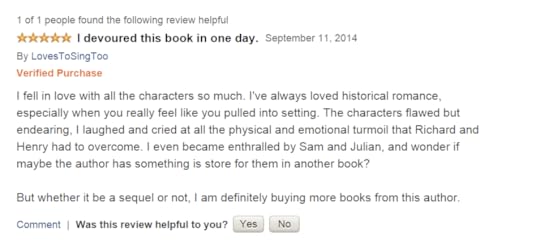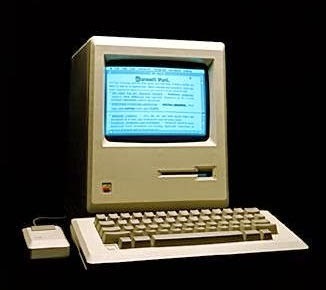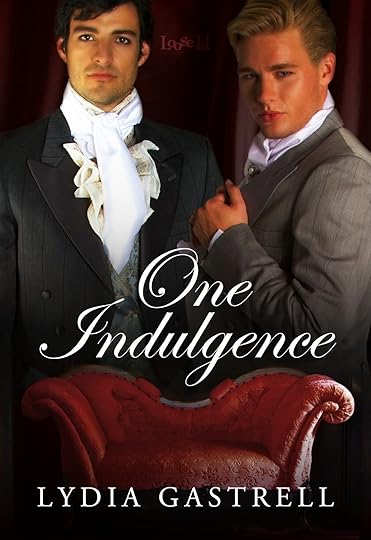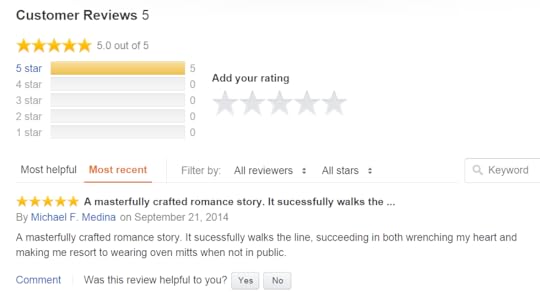Lydia Gastrell's Blog, page 4
September 21, 2014
5 Star Review for One Indulgence. "A masterfully crafted romance story."
Published on September 21, 2014 10:51
September 18, 2014
Currently Writing Book 2 of "Indulgence" Series
Thanks so much to Jodi Aherns for the lovely reviewAs for the "connections left handing"...I am currently writing the second book in my Indulgence series, which I plan to be a trilogy. The working title right now is One Glimpse, and our abused sub-character from One Indulgence, Sir Samuel Shaw, is the main character.
I do wish it were possible to for me to label the fact that One Indulgence is just the first book in a planned trilogy, but I guess I can understand why the publishers and book sellers don't want to do that when they aren't certain the second book will ever come, LOL.

I do wish it were possible to for me to label the fact that One Indulgence is just the first book in a planned trilogy, but I guess I can understand why the publishers and book sellers don't want to do that when they aren't certain the second book will ever come, LOL.

Published on September 18, 2014 20:37
September 14, 2014
Don't Forget! Kindle Alexander and Varian Krylov TOMORROW!
Don't Forget! Kindle Alexander's Full Disclosure and
Varian Krylov's Bad Things Both available tomorrow, September 15th, from various outlets. I know what I'm going to be doing this week...a hell of a lot of reading, =D
 Click for Amazon link.Bad Things, by Varian KrylovAlso available from Smashwords -
Here
Click for Amazon link.Bad Things, by Varian KrylovAlso available from Smashwords -
Here
 Click for Amazon link
Click for Amazon link
Full Disclosure, by Kindle Alexander.Also available from Kobo and Barns & Noble.
Varian Krylov's Bad Things Both available tomorrow, September 15th, from various outlets. I know what I'm going to be doing this week...a hell of a lot of reading, =D
 Click for Amazon link.Bad Things, by Varian KrylovAlso available from Smashwords -
Here
Click for Amazon link.Bad Things, by Varian KrylovAlso available from Smashwords -
Here
 Click for Amazon link
Click for Amazon link
Full Disclosure, by Kindle Alexander.Also available from Kobo and Barns & Noble.
Published on September 14, 2014 19:36
September 12, 2014
My First Review on Amazon.com - I'm tempted to print this and frame it =)
My First Review on Amazon.com - I'm tempted to print this and put it in a frame, just like a business owner framing his first dollar! =) *See the Amazon.com listing
 My heartfelt thanks to LovesToSingToo. To answer her question, there will indeed be a followup book to One Indulgence, and it will focus on Sir Samuel Shaw, the 'Sam' she mentioned. ~ LG
My heartfelt thanks to LovesToSingToo. To answer her question, there will indeed be a followup book to One Indulgence, and it will focus on Sir Samuel Shaw, the 'Sam' she mentioned. ~ LG
 My heartfelt thanks to LovesToSingToo. To answer her question, there will indeed be a followup book to One Indulgence, and it will focus on Sir Samuel Shaw, the 'Sam' she mentioned. ~ LG
My heartfelt thanks to LovesToSingToo. To answer her question, there will indeed be a followup book to One Indulgence, and it will focus on Sir Samuel Shaw, the 'Sam' she mentioned. ~ LG
Published on September 12, 2014 10:25
September 9, 2014
One Indulgence Now Available On Amazon!
 Now Available On Amazon! One Indulgence has gone live on Amazon.com today. I must say, it happened much faster than I thought it would. I love that technology, =D.
Now Available On Amazon! One Indulgence has gone live on Amazon.com today. I must say, it happened much faster than I thought it would. I love that technology, =D.
Published on September 09, 2014 17:04
September 8, 2014
Now Available!
 Now Available! Book #1 of the Indulgence Trilogy One Indulgence is now available for purchase from Loose Id. I am so thankful to all the great people at Loose Id, who have answered all my novice questions and tolerated all my technology shortcomings with good humor (warning, guys. I still have stupid novice questions I have yet to ask, lol).
Now Available! Book #1 of the Indulgence Trilogy One Indulgence is now available for purchase from Loose Id. I am so thankful to all the great people at Loose Id, who have answered all my novice questions and tolerated all my technology shortcomings with good humor (warning, guys. I still have stupid novice questions I have yet to ask, lol).There is an excerpt from Chapter One available through the Loose Id link, and the full Chapter One excerpt is available via the Goodreads page for One Indulgence.
You can also read some ARC reviews on the Goodreads page (link above). There are three so far and I hope to see many more in the near future. =)
~ LG
Published on September 08, 2014 21:19
August 26, 2014
What Year Is This, Anyway? How writers can really confuse...
What Year Is This, Anyway? How writers can really confuse their readers with contemporary  anachronisms. We're all smart and well read, but just to be thorough, let's remind ourselves what an anachronism actually is. Specifically, it is "an act of attributing a custom, event, or object to a period to which it does not belong." This is why we typically only think of anachronisms being a problem with period fiction, right? We modern people trying to write about a time in which we did not live and which few, if any, can remember is likely to be tricky. But our concern here isn't a period fiction set in the 18th century, or a spy drama from World War II. There are rampant and problematic anachronisms in contemporary fiction...stories that are supposed to be happening now.
anachronisms. We're all smart and well read, but just to be thorough, let's remind ourselves what an anachronism actually is. Specifically, it is "an act of attributing a custom, event, or object to a period to which it does not belong." This is why we typically only think of anachronisms being a problem with period fiction, right? We modern people trying to write about a time in which we did not live and which few, if any, can remember is likely to be tricky. But our concern here isn't a period fiction set in the 18th century, or a spy drama from World War II. There are rampant and problematic anachronisms in contemporary fiction...stories that are supposed to be happening now.
Readers are left tilting their heads and asking, "What year is this, anyway?"
To make my point, I will use the most recent novel that has consuming my precious hours as an example. Despite this novel's sound plot, amazing characters, and heart-warming romance, I was left distracted by the fact that I simply could not put an accurate stamp on the story.
Many may ask, "Why do you care?" If it's obvious that the novel is at least remotely contemporary--occurring in, say, the last 25 years--than does it really matter? Typically it wouldn't, but in this case I'm talking about an m/m romance novel. With that genre, it absolutely matters because the way Western society views and/or accepts homosexuality has undergone massive changes in just the last ten years, let alone the last thirty. So, in order to wrap my mind around how the characters thought, how their friends were likely to think, I needed to know the damn year...and I couldn't.
So, let's break down the most common anachronisms we see in contemporary fiction and how they can cause massive confusion when combined inappropriately (meaning, having them exist together in years where they would not have done so).
1) Cell Phones: If your novel is meant to take place at any time after the year 2000 or so, your characters need to have cell phones. They don't need to rely on them. The phones don't need to be a major plot tool, but they do at least have to be mentioned. Cell phones have altered the entire world, the way we do everything...from our jobs to our personal lives...everything. Having a novel completely devoid of cell phones tells the reader "this is taking place before the 1990s."
In my example novel, cell phones are not mentioned even once. In fact, the MCs still have answering machines. Why is this a problem? I will reveal that later.
2) Answering Machines:
Voice mail service became a common option of home phones in the late 90s, and by the 2000s didn't even cost extra in most places. Answering machines are dead. The only people who still have and use them are security nuts who want to record their phone activity and people who still write checks at the grocery store (generalized statement made intentionally. Relax ;). If your characters have answering machines and it isn't noted as being "strange" or "old", you are tacitly telling your readers that it's the 1990s or earlier. If that is not your target era, get rid of the answering machines. Once again, especially in a genre like m/m, this would matter. The social atmosphere surrounding homosexuality in the 1990s was nothing like it is today in the 2010s. It matters.
3) Women There are certain occupations that are still a "man's game," as they say, but those occupations typically used to be even more so. Thus, having your novel bursting at the seams with female cops, detectives, doctors, and fighter pilots is a good way of telling the reader that this is happening now--or that it's more likely happening in fairy-tale-future-land. We all want to support gender equality, but I don't think we accomplish that by being historically inaccurate or making the past what we wish it had been.
In my example novel, the MC works with three young, beautiful female detectives in just his own department, and it appears to be completely normal and no one makes any issue of it. It's not even noted as being unique. Trust me, that fact would be noted today, let alone in the 1990s when--I think?--my example novel is taking place.
4) Internet Dial up is a thing of the 1990s. Even if your novel is set in a rural, isolated area you're stretching the bounds of reality giving your characters dial-up internet service much later than 2006 or 2007. If you do add it at a later date, make a big deal about it. Have your characters bitch and moan about not having WiFi...something to make it realistic and to let the reader know that your novel is not set in 1997.
In my example novel, the NYC detective is irritated that he has to get a second phone line for his dial-up internet service. In New York City? In the mid 2000s? Come on....
5) Laws When you reference actual laws that exist in the real world, you are putting a very real time stamp on your novel. You are bracketing yourself into a box that means everything else must--or should, I think--match that year for continuity. If you don't want your novel to take place after 2010, don't mention the Affordable Care Act.
In my example novel, the MC notes the cigarette smoke in the New York City bar he's drinking at. Since NYC's smoking ban went into effect in 2003, and this was a big national story that everyone was aware of, I was now really confused, because... *see number 6
6) Video Games
Gaming consoles are created and released at pretty regular intervals. Therefore, referencing them is a good way of noting the year--especially if the character is getting the device as a new item.
*In my example novel, the MC's son wants a Wii for Christmas. The Wii was released in 2006. Yet another--unintentional?--time stamp. ~~ All of these things by themselves, or combined in the correct manner, are fine. You want your novel to take place in 1994? Go ahead and give them answering machines. You want the story to take place before 2003? Great! Let them smoke in the NYC bars. But...don't give them video game consoles that won't exist for another 3 years while you're at it.
In my example novel, everything seems to point to the book taking place in the 1990s. No cell phones, answering machines everywhere, barely a mention of the internet, smoking in the NYC bars...and then the MCs son asks for a Wii. Boom! Suddenly it's 2006 or later, and now the lack of cell phones and the internet looks bizarre and troublesome. Suddenly I'm wondering, "why doesn't he just call him on his phone and reschedule?" as the MC is racing across town to catch his lover before he leaves the house. Ah, I forgot. It's 2006, but no one has a cell phone. Because, you know, police detectives weren't carrying cell phones in 2006, right? =P
Once again, you may be shaking your head and saying, "Why does she care? Seriously, this chick is a period-accuracy Nazi!" I know, I know. But the reason it matters is because this novel in particular was m/m romance. Believing for half the book that it was 1995-ish put me in a particular frame of mind. I was expecting the heroes to be mistreated, ostracized, or worse...and when other characters were miraculously so open-minded and supportive, it felt fairy-tale fake. I would not have felt that way if the novel had accuratelyportrayed the year as being mid 2000s.
Contemporary anachronisms, just like those in period fiction, only really matter when they effect the atmosphere of the era. We don't need to dissect novels to see if a particular cologne existed during the year the MC gets it for Christmas because no one is aware of that crap anyway, and even if they were it doesn't matter. Big things that are a primary mark on society, like cell phones, laws, and the internet, matter. So, don't think you have to become a research hound just to write a contemporary fiction. All you have to do is observe the world around you, because that is, after all, what you're writing about.
 anachronisms. We're all smart and well read, but just to be thorough, let's remind ourselves what an anachronism actually is. Specifically, it is "an act of attributing a custom, event, or object to a period to which it does not belong." This is why we typically only think of anachronisms being a problem with period fiction, right? We modern people trying to write about a time in which we did not live and which few, if any, can remember is likely to be tricky. But our concern here isn't a period fiction set in the 18th century, or a spy drama from World War II. There are rampant and problematic anachronisms in contemporary fiction...stories that are supposed to be happening now.
anachronisms. We're all smart and well read, but just to be thorough, let's remind ourselves what an anachronism actually is. Specifically, it is "an act of attributing a custom, event, or object to a period to which it does not belong." This is why we typically only think of anachronisms being a problem with period fiction, right? We modern people trying to write about a time in which we did not live and which few, if any, can remember is likely to be tricky. But our concern here isn't a period fiction set in the 18th century, or a spy drama from World War II. There are rampant and problematic anachronisms in contemporary fiction...stories that are supposed to be happening now.
Readers are left tilting their heads and asking, "What year is this, anyway?"
To make my point, I will use the most recent novel that has consuming my precious hours as an example. Despite this novel's sound plot, amazing characters, and heart-warming romance, I was left distracted by the fact that I simply could not put an accurate stamp on the story.
Many may ask, "Why do you care?" If it's obvious that the novel is at least remotely contemporary--occurring in, say, the last 25 years--than does it really matter? Typically it wouldn't, but in this case I'm talking about an m/m romance novel. With that genre, it absolutely matters because the way Western society views and/or accepts homosexuality has undergone massive changes in just the last ten years, let alone the last thirty. So, in order to wrap my mind around how the characters thought, how their friends were likely to think, I needed to know the damn year...and I couldn't.
So, let's break down the most common anachronisms we see in contemporary fiction and how they can cause massive confusion when combined inappropriately (meaning, having them exist together in years where they would not have done so).
1) Cell Phones: If your novel is meant to take place at any time after the year 2000 or so, your characters need to have cell phones. They don't need to rely on them. The phones don't need to be a major plot tool, but they do at least have to be mentioned. Cell phones have altered the entire world, the way we do everything...from our jobs to our personal lives...everything. Having a novel completely devoid of cell phones tells the reader "this is taking place before the 1990s."
In my example novel, cell phones are not mentioned even once. In fact, the MCs still have answering machines. Why is this a problem? I will reveal that later.
2) Answering Machines:

Voice mail service became a common option of home phones in the late 90s, and by the 2000s didn't even cost extra in most places. Answering machines are dead. The only people who still have and use them are security nuts who want to record their phone activity and people who still write checks at the grocery store (generalized statement made intentionally. Relax ;). If your characters have answering machines and it isn't noted as being "strange" or "old", you are tacitly telling your readers that it's the 1990s or earlier. If that is not your target era, get rid of the answering machines. Once again, especially in a genre like m/m, this would matter. The social atmosphere surrounding homosexuality in the 1990s was nothing like it is today in the 2010s. It matters.
3) Women There are certain occupations that are still a "man's game," as they say, but those occupations typically used to be even more so. Thus, having your novel bursting at the seams with female cops, detectives, doctors, and fighter pilots is a good way of telling the reader that this is happening now--or that it's more likely happening in fairy-tale-future-land. We all want to support gender equality, but I don't think we accomplish that by being historically inaccurate or making the past what we wish it had been.
In my example novel, the MC works with three young, beautiful female detectives in just his own department, and it appears to be completely normal and no one makes any issue of it. It's not even noted as being unique. Trust me, that fact would be noted today, let alone in the 1990s when--I think?--my example novel is taking place.
4) Internet Dial up is a thing of the 1990s. Even if your novel is set in a rural, isolated area you're stretching the bounds of reality giving your characters dial-up internet service much later than 2006 or 2007. If you do add it at a later date, make a big deal about it. Have your characters bitch and moan about not having WiFi...something to make it realistic and to let the reader know that your novel is not set in 1997.
In my example novel, the NYC detective is irritated that he has to get a second phone line for his dial-up internet service. In New York City? In the mid 2000s? Come on....
5) Laws When you reference actual laws that exist in the real world, you are putting a very real time stamp on your novel. You are bracketing yourself into a box that means everything else must--or should, I think--match that year for continuity. If you don't want your novel to take place after 2010, don't mention the Affordable Care Act.
In my example novel, the MC notes the cigarette smoke in the New York City bar he's drinking at. Since NYC's smoking ban went into effect in 2003, and this was a big national story that everyone was aware of, I was now really confused, because... *see number 6
6) Video Games

Gaming consoles are created and released at pretty regular intervals. Therefore, referencing them is a good way of noting the year--especially if the character is getting the device as a new item.
*In my example novel, the MC's son wants a Wii for Christmas. The Wii was released in 2006. Yet another--unintentional?--time stamp. ~~ All of these things by themselves, or combined in the correct manner, are fine. You want your novel to take place in 1994? Go ahead and give them answering machines. You want the story to take place before 2003? Great! Let them smoke in the NYC bars. But...don't give them video game consoles that won't exist for another 3 years while you're at it.
In my example novel, everything seems to point to the book taking place in the 1990s. No cell phones, answering machines everywhere, barely a mention of the internet, smoking in the NYC bars...and then the MCs son asks for a Wii. Boom! Suddenly it's 2006 or later, and now the lack of cell phones and the internet looks bizarre and troublesome. Suddenly I'm wondering, "why doesn't he just call him on his phone and reschedule?" as the MC is racing across town to catch his lover before he leaves the house. Ah, I forgot. It's 2006, but no one has a cell phone. Because, you know, police detectives weren't carrying cell phones in 2006, right? =P
Once again, you may be shaking your head and saying, "Why does she care? Seriously, this chick is a period-accuracy Nazi!" I know, I know. But the reason it matters is because this novel in particular was m/m romance. Believing for half the book that it was 1995-ish put me in a particular frame of mind. I was expecting the heroes to be mistreated, ostracized, or worse...and when other characters were miraculously so open-minded and supportive, it felt fairy-tale fake. I would not have felt that way if the novel had accuratelyportrayed the year as being mid 2000s.
Contemporary anachronisms, just like those in period fiction, only really matter when they effect the atmosphere of the era. We don't need to dissect novels to see if a particular cologne existed during the year the MC gets it for Christmas because no one is aware of that crap anyway, and even if they were it doesn't matter. Big things that are a primary mark on society, like cell phones, laws, and the internet, matter. So, don't think you have to become a research hound just to write a contemporary fiction. All you have to do is observe the world around you, because that is, after all, what you're writing about.
Published on August 26, 2014 18:22
August 16, 2014
Watch and Word Society: Romance/Erotica Book Reviews: Book Review: One Indulgence
One Indulgence Gets First Review: 4.75/5 Stars! =)
Watch and Word Society: Romance/Erotica Book Reviews: Book Review: One Indulgence: Title : One Indulgence Author : Lydia Gastrell Publisher/GR Link : Loose Id (Release date 9/9/14), GR Genre : Historical, MM...
Watch and Word Society: Romance/Erotica Book Reviews: Book Review: One Indulgence: Title : One Indulgence Author : Lydia Gastrell Publisher/GR Link : Loose Id (Release date 9/9/14), GR Genre : Historical, MM...
Published on August 16, 2014 19:52
August 9, 2014
Cover art for One Indulgence has arrived!I would like to ...
Cover art for One Indulgence has arrived!I would like to thank all the lovelies at Loose Id, but especially April Martinez who designed the covers. I was especially pleased with the red sofa. Don't think it's just image filler. A very elegant, very comfortable Regency era sofa plays a pretty big role in the opening chapters of One Indulgence. Clever addition, April! ;) ~Lydia Gastrell


Published on August 09, 2014 20:24
July 27, 2014
What's in a name? Or...in a pseudonym? If no one has...
What's in a name? Or...in a pseudonym? If no one has guessed, Lydia Gastrell is not my real name. Having false names for public use is incredibly common and shouldn't imply that I am embarrassed or ashamed of anything or trying to "hide." Okay, maybe I am trying to "hide" from my parents, but that's pretty much it, =P. It's a protective measure more than anything else. But, someone asked me yesterday how I came up with my pen name, so I thought I would give you the story.
I wanted something as unique as possible, and what's the current definition of "unique". Well, it has a lot to do with how many Google hits you get. I wanted a unique name that would be mine, one that would not lead to anyone else or anything else but what I DID. Pretty tall order, I know. There are 7 billion people, after all. That's a lot of name combinations and a lot of repeats.
I started by researching extinct or endangered surnames. There are actually a lot of these, especially in the UK (the trend of dying or extinct surnames is probably going to become a thing of the past in the West, since marriage and the traditional transfer of surnames from husband to wife, father to child, is becoming less popular). I discovered the last name Gastrell was reported to have only "27 surviving persons with this name". Wow. That's pretty small. I already knew I wanted the first name Lydia, since I have always thought it was beautiful name and rolls off the tongue easily. So...Lydia Gastrell? Was there one? Damn! Yes, there was!
 But, the last known recording of that name (at least according to the almighty Google Machine) was a church register from 1791, indicating that a widow, one Lydia Gastrell, married and became Lydia Gastrell Thomas. Yes! A name that had no recorded use since the 18th century? Oh, I could do that =D
But, the last known recording of that name (at least according to the almighty Google Machine) was a church register from 1791, indicating that a widow, one Lydia Gastrell, married and became Lydia Gastrell Thomas. Yes! A name that had no recorded use since the 18th century? Oh, I could do that =D
**the picture shows a house in Bath, UK, where the original Lydia Gastrell lived after remarrying in 1791.
I wanted something as unique as possible, and what's the current definition of "unique". Well, it has a lot to do with how many Google hits you get. I wanted a unique name that would be mine, one that would not lead to anyone else or anything else but what I DID. Pretty tall order, I know. There are 7 billion people, after all. That's a lot of name combinations and a lot of repeats.
I started by researching extinct or endangered surnames. There are actually a lot of these, especially in the UK (the trend of dying or extinct surnames is probably going to become a thing of the past in the West, since marriage and the traditional transfer of surnames from husband to wife, father to child, is becoming less popular). I discovered the last name Gastrell was reported to have only "27 surviving persons with this name". Wow. That's pretty small. I already knew I wanted the first name Lydia, since I have always thought it was beautiful name and rolls off the tongue easily. So...Lydia Gastrell? Was there one? Damn! Yes, there was!
 But, the last known recording of that name (at least according to the almighty Google Machine) was a church register from 1791, indicating that a widow, one Lydia Gastrell, married and became Lydia Gastrell Thomas. Yes! A name that had no recorded use since the 18th century? Oh, I could do that =D
But, the last known recording of that name (at least according to the almighty Google Machine) was a church register from 1791, indicating that a widow, one Lydia Gastrell, married and became Lydia Gastrell Thomas. Yes! A name that had no recorded use since the 18th century? Oh, I could do that =D **the picture shows a house in Bath, UK, where the original Lydia Gastrell lived after remarrying in 1791.
Published on July 27, 2014 13:03




